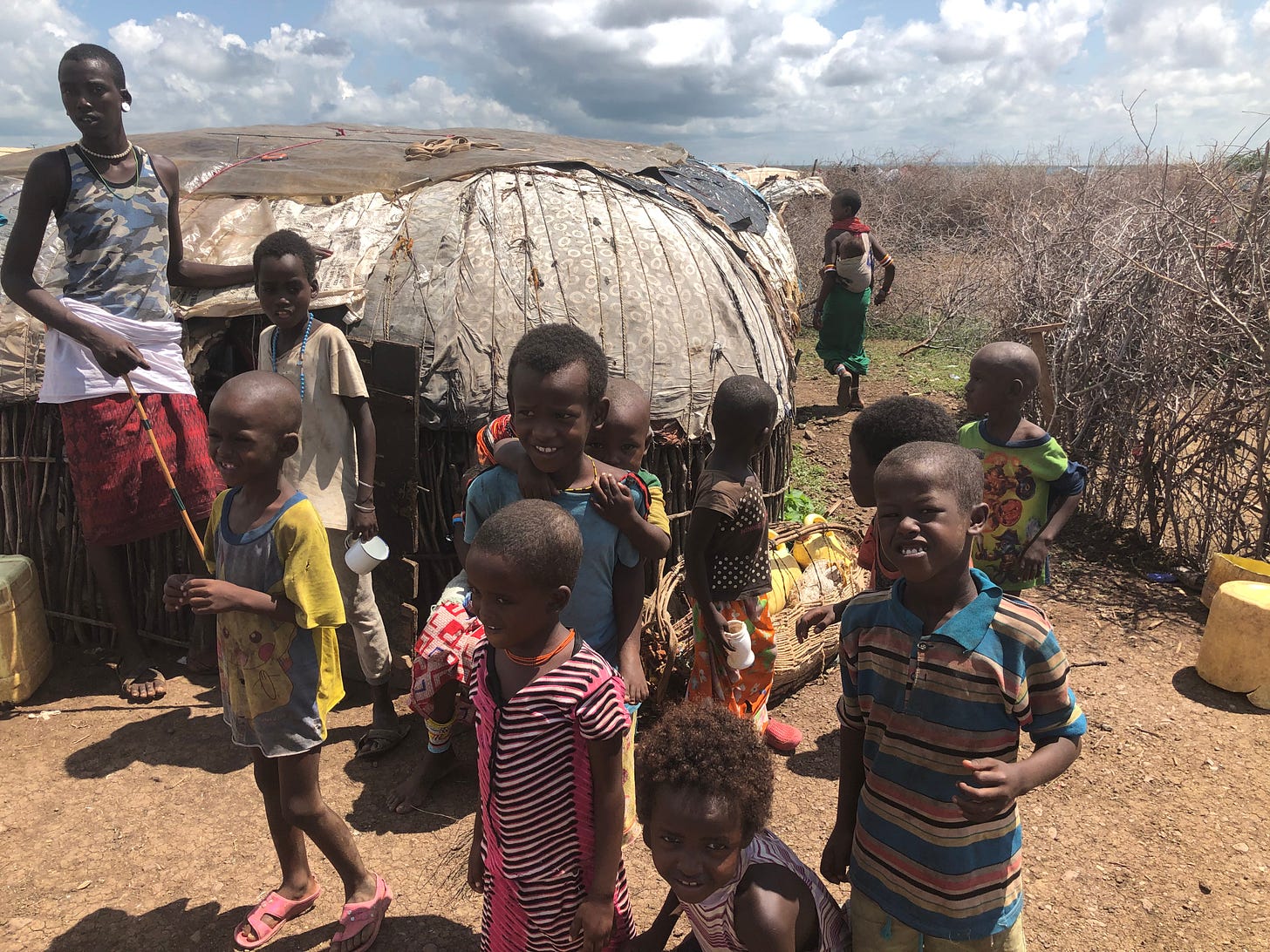I am one of Ketchum’s remote workers. This week, I have been in Nairobi and Kakuma, Kenya, for my role as Chair of BOMA.ngo.
Whenever I think of the problems we have in the WRV, they pale compared to the challenges faced by the ultra-poor in Africa. Africa is the only continent in which starvation-level poverty continues to grow. Four hundred million Africans are food insecure. 100 million live as subsistence pastoralists on the edge of the desert. No one on the planet needs to starve—we grow 1.5x the food we consume. Starvation is not a capacity challenge; it is a systems challenge.
For years, I looked for a non-profit with a solution to this, and in 2016, I discovered The BOMA Project. Eight years ago, I joined the BOMA1 board.
At that time, BOMA was at an inflection point. Its founder, Kathleen Colson, was nearing retirement. Would BOMA survive her departure? Kathleen is a force of nature and is revered as a saint in parts of Africa. 2 Over nine years, she had grown BOMA into an impactful non-profit with an ambitious aim of ending ultra-poverty in the dry lands of Africa. She developed a methodology for teaching illiterate and innumerate pastoralist women how to run small businesses. Program participants are typically sold into marriage at a young age with no education. They are expected to care for their husbands, who were often absent for long periods with livestock herds or trying to make money as laborers in cities. The family size averages six children.
The BOMA program mentors participants over two years in the basics of running a small business: goat breeding, small store, or raising chickens. The participants go from having only what their husbands give them to having two or three independent income sources.3 Graduates can better feed their families and send their children to school.
This is an intervention that works. Indeed, according to the participants, no intervention works as well as what BOMA provides them—self-reliance. Five years after BOMA leaves an area, 80% of the small businesses continue to operate. BOMA is a catalyst, not a charity. It provides education, not handouts.
The best part of the job is seeing a participant before and after the program. Before the program, she had little self-confidence and was often overwhelmed by life. After the program, she brims with self-confidence and has hopes for the future.
After two years of learning about BOMA and Africa, I became Chair. My vision for BOMA has been to reach as many participants as quickly as possible. We created a growth mindset and developed a growth strategy. We brought a for-profit sense of urgency and an emphasis on data-driven results to the organization. We built a world-class leadership team in Nairobi.
BOMA has grown over 50% each year for the past six years. We have expanded our donor base from individuals to major foundations and governments. We were the first poverty graduation program provider to receive a grant from Mackenzie Scott. Our budget was about $1.5mm when I started, and we reached about 5,000 participants. Our budget is $20mm this year, and we enrolled 50,000 participants.
We transformed BOMA from a small VT-based charity into the most prominent African provider of poverty graduation programs. BOMA employs over 500 people in six countries. Our CEO is Dr. Sam Owilly, the noted Kenyan veterinarian who pivoted to working with people. The board has evolved to an international board with African, US, and European members. On Friday, after six years in the chair, I will hand the rungu stick to Elsie Mbugua, MBS.
Much work remains to be done. Africa is the only continent where starvation-level poverty continues to grow. While stepping out of the chair, I will stay on the board—once in the BOMA, always in the BOMA!
If you ever want to visit Kenya, please let me know; I can set you up to see how sustainable economic development can work.
BOMA is not an acronym. “Boma” means place of safety or homestead in Swahili.
This is not hyperbole. She is known as “Mama Rungu,” or powerful mother.
This is not microfinance—BOMA participants do not have the numeracy to keep the records necessary for microfinance.






Peter,
I am a board member of crossingthresholds.org, a non-profit that builds and operates 5 elementary schools in the Kibera slum of Nairobi. I will be on a trip to the schools in January along with about 20 others on our semi-annual trip where we work to provide education, food and hope to our 1300 + students. Providing entrepreneurial education and support to the kid’s mothers would be a great next step and I’m hoping I might connect with BOMA when I’m in Nairobi in January to discuss this. Pls advise if this might be possible. Thanks-Dave Squier, (Ketchum part-time resident, friend of the Ullman’s)
Perry, if you are not corresponding with Shoshana Stewart (an American), runs Turquoise Mountain (TM), an NGO working to drive regeneration through an artistic revival, in Afghanistan and beyond. I highly encourage you to get in touch with her. She's a force of nature and is very good at what she does.
TM has an effective model for giving women a path to financial agency and Shoshana. Her husband, Rory Stewart (British) and is a former MP. King Charles III who set up the project originally and it was run by Rory until Shoshana, who went to Afghanistan as a volunteer, took over as President of the NGO. Actually, I'd be surprised if you have not met Shoshana:
-- LinkedIn: Shoshana Stewart: linkedin.com/in/shoshana-stewart/?originalSubdomain=uk
-- Yale Jackson School of Global Affairs: jackson.yale.edu/person/shoshana-stewart/
-- Turquoise Mountain: turquoisemountain.org/
-- Wikipedia: Rory Stewart: wikipedia.org/wiki/Rory_Stewart
-- YouTube: Rory Stewart (and Alastair Campbell) - The Rest Is Politics Podcast:
youtube.com/@restispolitics
Keep fighting the good fight. Cheers.